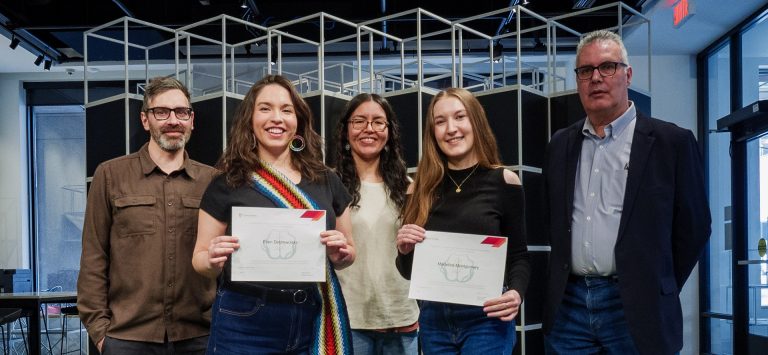Concordia’s 3rd annual Miywâcimo! storytelling competition highlights Indigenous student research

Miywâcimo!, the third edition of Concordia’s annual Indigenous Directions Storytellers Competition, took place on March 26.
The competition is hosted by Concordia’s Office of Indigenous Directions in collaboration with 4TH SPACE. It provides Indigenous students with a platform to give a four-minute presentation on their graduate research to a panel of judges and the wider community. The event emphasizes Indigenous values and knowledge systems and creates funding opportunities for Indigenous students. “Miywâcimo” is a nēhiyawēwin (Cree) word meaning “tell a good story.”
Ellen Dobrowolski is a PhD candidate in the Department of Religions and Cultures and a member of the Métis Nation, specifically the northeast region of British Columbia covered by Treaty 8. Dobrowoslki won first place for their presentation “We Made the Church Our Relative: Métis Relationality and Religion.” Their doctoral project investigates the life and work of Sara Riel (Sœur Marguerite-Marie) who was one of the first Métis Grey Nuns and the first Métis missionary.
“I have found in my research that Métis religion and religiosity are often misunderstood and misrepresented by non-Métis scholars who cannot see the Métis cultural frameworks undergirding our expressions of Christianity,” Dobrowolski says.
“I started my presentation by highlighting the Cree and Métis concept of ‘wâhkôhtowin’ which is an ethos of relatedness that pulls together all of creation into a web of kinship. It was through that lens that I wanted to present Sara Riel and her work as a Métis Grey Nun and explore her story not as one of assimilation, but as an expression of Métis relatedness.”
3 strong contenders
Judges Nicolas Renaud, Ronald Abraira and Sigwan Thivierge, all Concordia faculty, awarded Dobrowolski a first prize of $5,000 for her outstanding presentation. This year’s participants also included Madeline Montgomery and Maddison Schmitt, who took home prizes of $2,500 and $800, respectively.
“All three presentations were strongly delivered and it was impressive to see how they could pack the core ideas of their graduate research into the four-minute duration,” Renaud says.
“Ellen Dobrowolski's presentation proposed an original approach to a complex topic, reframing the Christian religion in Métis culture within cultural principles of kinship, relationality and the coexistence of a plurality of beliefs and practices. It was rooted in specific communities and a family history.”
Montgomery is an MA student in the Department of Creative Arts Therapies, Drama Therapy Option and a member of the Métis Nation of Alberta. Her presentation was entitled “Stories and Medicine: Drama Therapy for Survivors of Trauma.” In it, she explored how drama, storytelling and performance can be used as therapeutic interventions to support survivors of sexual trauma.
Schmitt, a citizen of the Red River Métis, is a Two-Spirit local member and a master’s student in the Individualized Program. Their thesis project combines sight-specific performance art and creation practices with historical research methodologies to facilitate collaborative community creation practices. Their Miywâcimo! presentation, which was centred on their own great-granduncle and niece, was called “A Pedestal for Uncle Mack, A Song for Ramona.”
Dobrowolski decided to participate in the competition because of her previous positive experiences with Indigenous Directions’ programming. She says the participants were given a lot of guidance throughout their preparation for the competition and the opportunity to speak with each other and share about their fields and projects.
“I'm really grateful to connect with other Indigenous grad students and see the amazing work that they are doing that both advances Indigenous research and connects them to their families and communities,” she adds.
To watch the recording of the Miywâcimo! live stream, visit the 4TH SPACE YouTube channel. To learn more about the storytelling competition, visit the Miywâcimo! web page.


